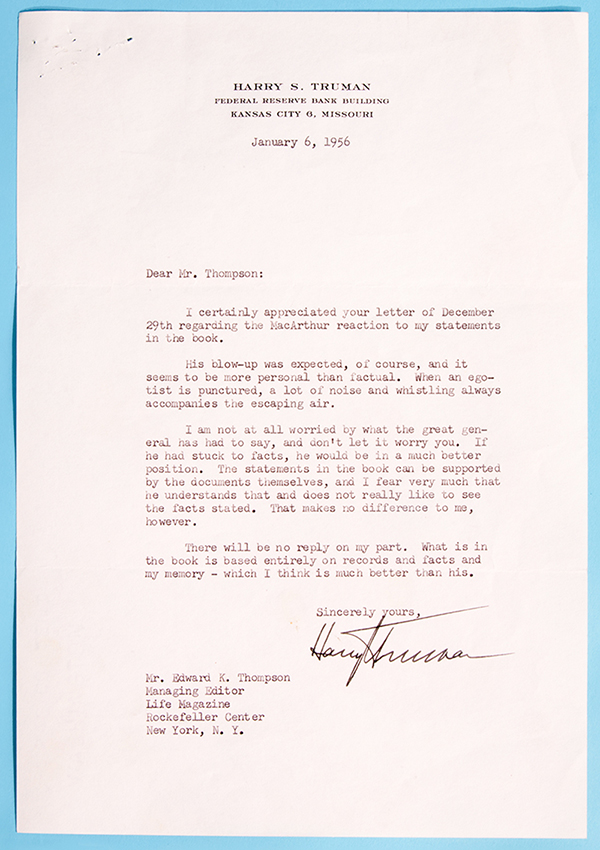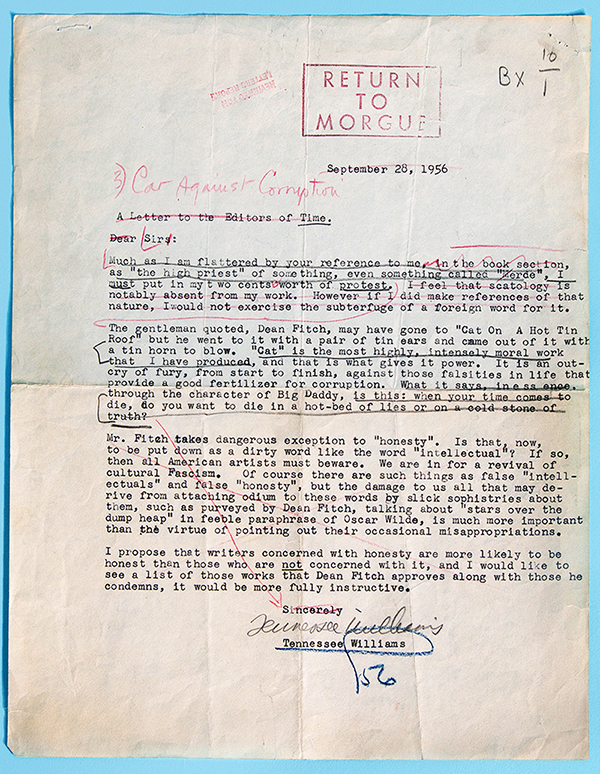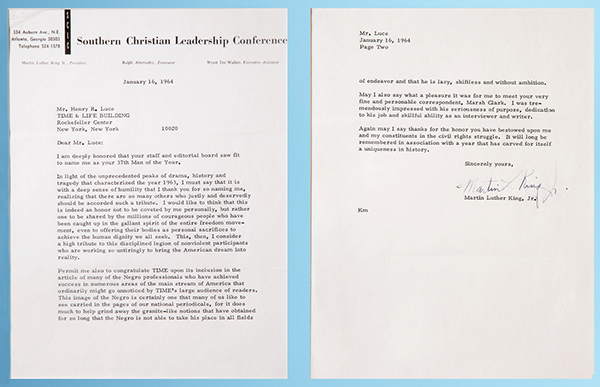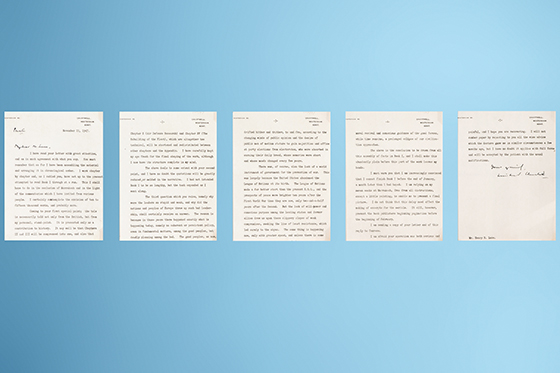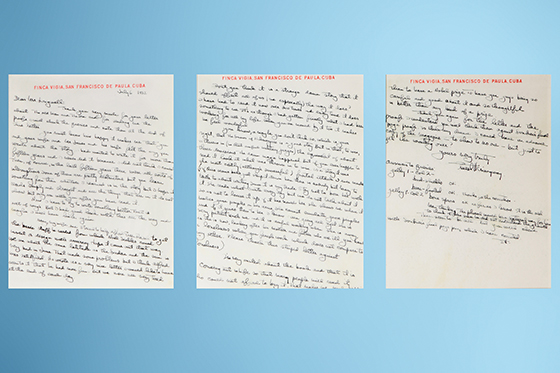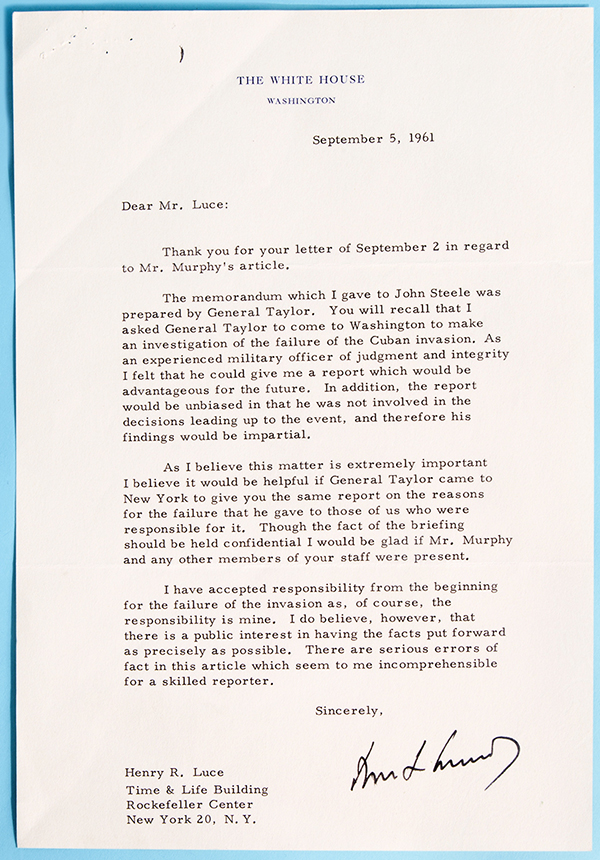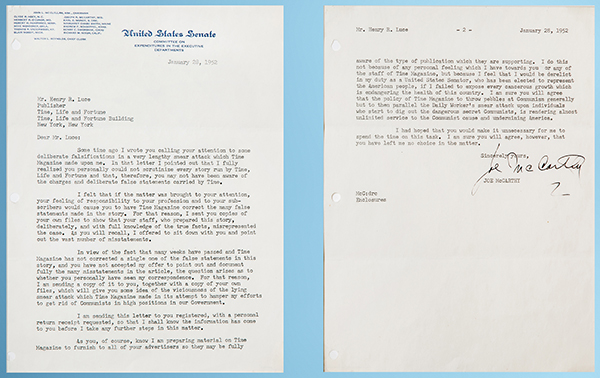As Time Inc. moves to a new office in Lower Manhattan, the company is also moving its vast archives—a trove of more than 7 million items—to the New-York Historical Society. To mark the move, we’ve highlighted some of the archives’ most impressive artifacts.
Here are the most fascinating letters in the company’s collection from the likes of Winston Churchill, John F. Kennedy, Harry Truman, Tennessee Williams and other historic figures.
The letters below are excerpted or included in full, with their transcription and description pulling in large part from Stuart Lutz‘s appraisal of the documents.
Read More: 13 Interesting Artifacts From Inside the Time Inc. Archives
President Harry Truman
A letter from President Harry Truman, post-Presidency, to Edward Thompson, the managing editor of LIFE, discussing General MacArthur, who Truman had relieved from command.
I certainly appreciated your letter of December 29th regarding the [General Douglas] MacArthur reaction to my statements in the book. His blow-up was expected, of course, and it seems to be more personal than factual. When an egotist is punctured, a lot of noise and whistling always accompanies the escaping air. I am not at all worried by what the great general has to say, and don’t let it worry you. If he had stuck to facts, he would be in a much better position. The statements in the book can be supported by the documents themselves, and I fear very much that he understands that and does not really like to see the facts stated. That makes no difference to me, however. There will be no reply on my part. What is in the book is based entirely on records and facts and my memory – which I think is much better than his.
Playwright Tennessee Williams
A typed letter signed by playwright Tennessee Williams to the Editors of TIME, criticizing a review of ‘Cat on a Hot Tin Roof.’
Martin Luther King Jr.
Martin Luther King, Jr. wrote this letter thanking Henry Luce for TIME’s decision to name the civil rights leader as the Man of the Year in 1963. The March on Washington had just taken place that August, where Rev. King, TIME’s first black Person of the Year, delivered the famous “I Have a Dream” speech.
Winston Churchill
A lengthy letter from Winston Churchill to Time Inc. founder Henry Luce in which Churchill writes about publishing excepts of his history book in LIFE, and blames World War II on the United States’ failure to approve the League of Nations after World War I.
I have read your letter with great attention, and am in much agreement with what you say… The third question, which you raise namely why were the leaders so stupid and weak, and why did the nations and peoples of Europe throw up such bad leadership, shall certainly receive an answer. The reason is because in those years there happened exactly what is happening today, namely no coherent or persistent policy, even in fundamental matters, among the good peoples, but deadly planning among the bad. The good peoples, as now, drifted hither and thither, to and fro, according to the changing winds of public opinion and the desire of public men of medium stature to gain majorities and office at party elections from electorates, who were absorbed in earning their daily bread, whose memories were short and whose moods changed every few years. There was also, of course, a lack of world instrument of government for the prevention of war. This was largely because the United States abandoned the League of Nations at its birth. The League of Nations made a far better start than the present U.N.O [United Nations Organization], and the prospects of peace were brighter ten years after the First World War than they are now, only two-and-a-half years after the Second. But the lack of will-power and conscious purpose among the leading states and former allies drew us upon those slippery slopes of weak compromises, seeking the line of least resistance, which led surely to the abyss. The same thing is happening now, only with greater speed, and unless there is some moral revival and conscious guidance of the good forces, while time remains, a prolonged eclipse of our civilization approaches.
Ernest Hemingway
A handwritten letter from Ernest Hemingway to LIFE executive editor Daniel Longwell in which the author mentions one of his most famous novels, ‘The Old Man And The Sea’ and discusses what might be his most notable short story, ‘The Snows Of Kilimanjaro.’ He also mentions the Nobel Prize in Literature, which he was awarded in 1954. On September 1st, 1952, Life devoted 30,000 words across twenty uninterrupted pages to publish ‘The Old Man And The Sea.’
Thank you very much for your letter about The Old Man and The Sea and for sending me the proofs. I will check the queries and note them at the end of this letter. You must know how happy it makes me that you and your wife and Mr. James and his wife feel the way you wrote about the story. I had wanted to write it for more than fifteen years and I never did it because I did not think I could then, of course, in the last fifteen years, there were all sorts of interruptions some of them pretty destructive but you learn something from them. Whatever I learned is in the story but I hope it ready simply and straight and all the things that are in it do not show but are only with you after you have read it. Now I have to write something better that is sort of rough. But I had good luck with this all the way and maybe I will have…again… Don’t you think it is a strange damn story that it should affect all of us (me especially) the way it does? I have had to read it now over 200 times and every time it does something to me. It’s as though I had gotten finally what I had been working for all my life. When you are moved by it too, it makes me feel wonderful. You know, or maybe you don’t think so, which is your right, that the Snows of Kilimanjaro is a good story. But in that, to win, I threw in (in that awful military jargon) the equivalent of about three divisions. The damn magic happened. But if you ever happen to read it, look what was thrown in to win. As a story it was the most costly (although successful) frontal attack I ever made. (If this seems balls just skip it down here there is nobody but Mary to talk about writing since it is my trade I try not to bore her with it. She reads what I write every day but we do not talk about it so as not to louse it up. If it has moved her she shows me where it makes goose pimples on her arms. She cannot simulate goose pimples and if it gives them to her I know I am going all right. She is very patient with me and it is so awful working when she is away, as she is now, looking after her mother and father who are ill. You have a loneliness when you finish work which does not compare to any other. Please chalk this stupid letter against loneliness.) I’m very excited about the book and that it is coming out in Life so that many people will read it who could not afford to buy it. That makes me much happier than to have a Nobel Prize [in Literature] to have you guys being so careful and good about it and so thoughtful is better than any kind of prize. Thank you again for the letter and the proofs. I understand you will check them against Scribner’s final page proofs. Is there any chance I could have an advance copy of the magazine – to show to no one – but just to get the waiting over?
President John F. Kennedy
A typed letter from President John F. Kennedy to Henry Luce, in which the President admits fault for the failed April 1961 Bay of Pigs invasion.
Senator Joseph McCarthy
A typed letter from Senator Joseph McCarthy threatening Time Inc. founder Henry Luce over an article he called a “smear attack…upon me.”
More Must-Reads from TIME
- Why Trump’s Message Worked on Latino Men
- What Trump’s Win Could Mean for Housing
- The 100 Must-Read Books of 2024
- Sleep Doctors Share the 1 Tip That’s Changed Their Lives
- Column: Let’s Bring Back Romance
- What It’s Like to Have Long COVID As a Kid
- FX’s Say Nothing Is the Must-Watch Political Thriller of 2024
- Merle Bombardieri Is Helping People Make the Baby Decision
Contact us at letters@time.com
